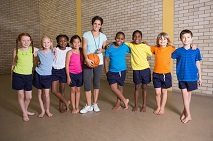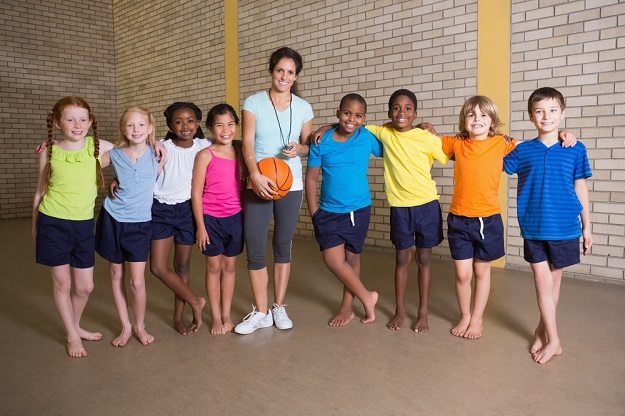Inclusive PE: What You Need to Know

Is Inclusive Physical Education taught in your child’s school? As a partner of the Together Counts™ program for healthy, active living, we’re here to provide you with helpful information about Inclusive Physical Education (PE) and the benefits for ALL students.
What: Inclusive PE is the term used for a general education (Gen Ed) physical education class in which all students are included. This includes any student with a disability who may or may not also be receiving Adapted Physical Education (APE) by a special APE Teacher. (APE is provided to students with disabilities as part of the special education services they receive.) Inclusive PE is part of the general education services and involves placing students with their peers with support and proper accommodations to help make everyone successful.
Who: Inclusive PE includes everyone who can safely be included in a general PE class. This involves most students with disabilities. The greatest percentage of students with disabilities falls under the group “learning disabilities” (~ 45%) followed by “speech and language disorders” (~19%). The rest of the students with disabilities fall into the categories of “intellectually disabled,” “emotionally disturbed,” “other health impaired” and other disabilities combined. Most students with disabilities (92% at elementary and 88% at secondary level) are mainstreamed into general PE classes.
Why: Inclusion has benefits for all students alike. Students with disabilities gain valuable social skills when working and playing in the general education environment. They learn appropriate behavior from their peers and have more opportunities to participate in age-appropriate physical activities. Students develop relationships with their general education peers. Oftentimes, higher expectations lead children with disabilities to achieve more, gain confidence, and develop a stronger sense of self.
On the other hand, the general education students also gain many advantages from inclusion. First, as they are exposed to children with disabilities they tend to become more understanding of and develop more positive attitudes toward others with differences. They are less likely to see disability as an impairment and more likely to see it simply as a difference and accept them more readily. It has also been shown that when students are given the chance to be an “expert” in an area and become peer tutors, it helps them increase their abilities in that area. In addition, when teachers create opportunities for students to learn in a variety of ways it helps not just those with disabilities, but all students. There is no evidence at all that Gen Ed students lose academic or social skills as a result of inclusion. All evidence points to a win-win situation for all students.
How: Teachers of PE (whether they are classroom teachers or PE Specialists) have been involved in inclusive PE for a long time. There are myriad ways to create an inclusive environment that enables all students to reach objectives safely and enjoyably!
For many students with disabilities there may be little or no modifications necessary. For those who need some sort of adaptation in order to participate safely and successfully, teachers can and do use a wide variety of strategies. Good teachers will be using these types of modifications for all students to achieve success, not just those who are disabled. Here are a few examples:
- Using cooperative learning groups to learn a dance
- Using video clips to view a specific skill as well as video feedback so they see themselves
- Modifying the rules so all players must receive a pass before they may attempt to score
- Using a ball that makes noise for students with visual impairments
- Using a lower, larger basket for students in wheelchairs
- Having a peer tutor work one on one to practice underhand throwing to targets
- Use resources like the SPARK Inclusive PE Guidebook to provide strategies to engage all students in physical education
Inclusive PE is probably happening at your child’s school presently. If it’s being done well, it is most likely a positive experience for everyone! If you have questions about inclusive PE and how it is being implemented at your child’s school; talk with their PE teacher and get informed.
SPARK is a research-based program that provides award-winning, evidence-based programs for Physical Education (K-12), Classroom Physical Activity & Recess, After School, Early Childhood, Nutrition and Health. Since 1989, SPARK has provided curriculum, training, and consultation to over 100,000 teachers and youth leaders worldwide.
Check out these reads on staying healthy and active from Together Counts!

